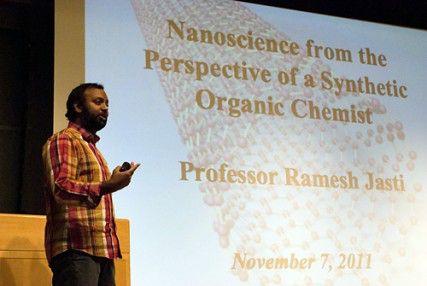
Monday marked the beginning of Nanovember, a week-long lecture series organized to raise awareness about nanotechnology and to dispel any myths that may exist about its use, Boston University Students for the Advancement of Nanotechnology members said.
Hosted by SANT, Nanovember features four lectures by BU professors and a Brown University doctorate student. The art exhibition will showcase pictures of BU professors’ research in nanotechnology to combine the world of art and science, said College of Engineering junior Jyotsna Singh, the SANT secretary.
“Nanotechnology is a booming field,” she said.
Assistant chemistry professor Ramesh Jasti said he held a lecture Monday about nanoscience from the perspective of a synthetic organic chemist. His laboratory students work to synthesize molecular structures with applications in nanotechnology, he said.
“The fun with nanoscience is that it is such a new field and therefore there is so much to be discovered,” Jasti said. “I would encourage undergraduate students to seek out experiences in research groups and get a sense for science outside of the classroom.”
The lecture series aimed to expose students to more than what they would see in their typical classes, Jasti said.
“I anticipate that nanoscience will have a dramatic impact on society. Therefore, it seems logical and natural to let students know of the advances going on at their own institution,” he said.
The Nanovember series will feature a lecture on Tuesday by Aaron Laroque, a post-doctorate student at Brown University, about his work in biomedical engineering, Singh said. Other lectures include assistant electrical and computer engineering professor Ajay Joshi’s research on nanoscale memristor technology and assistant medical engineering professor Dan Cole’s research on carbon nanotubes and their impact on nanoelectronic devises.
“Even if students do not choose this field as one they wish to work in, undoubtedly they will have contact during their careers with others that do, such as in biotechnology and new medical treatments,” Cole said. “By being more informed, then they will be able to interact more effectively.”
ENG freshman Bethany Moore said that she is attending Nanovember to explore what opportunities will be available for her later in her undergraduate years. She said her interest in nanotechnology sparked in middle school when the school’s First Lego League introduced it.
As president of the SANT group, College of Arts and Sciences senior Kyle Barrett said that he sees that most people do not think of nanotechnology as part of something larger than nanoscience, even though it applies to agricultural sciences, mechanical sciences and other fields.
SANT Vice President Venkata Yelleswarapu, an ENG sophomore, said that while ENG offers a concentration in nanotechnology, students do not seem aware of the power nanotechnology will have in the future.
“Working on such a small scale gives many compounds completely new properties that can be modified for functions in fields such as medicine, materials, communication, et cetera,” Yelleswarapu said. “We believe that BU students should be on top of this upcoming revolution and lead the changes to come.”
This is an account occasionally used by the Daily Free Press editors to post archived posts from previous iterations of the site or otherwise for special circumstance publications. See authorship info on the byline at the top of the page.



